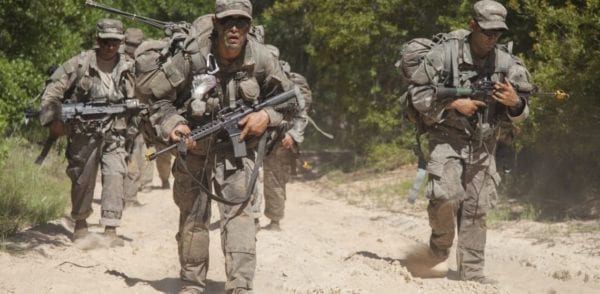Years ago, I attended the Army’s Ranger School as a young soldier assigned to the 1st Battalion of the 75th Ranger Regiment. The tradition of Ranger units dates back to the French and Indian War when Major Robert Rogers organized these units and established the ‘Rules of Ranging’ as foundational guidelines for military operations.
The Ranger Department was established as a branch of the Infantry School to develop combat skills among selected officers and enlisted personnel.
The Army Rangers, formed during the American Revolution, are renowned for their elite status and rigorous training. This course is one of the toughest training environments offered by the Army. The course prepares officers and enlisted soldiers for combat arms-related functional skills.
Ranger Training
Ranger training was established in 1950 at Fort Benning, Georgia, and has changed little since then. The Ranger Training Brigade conducts the United States Army’s Ranger School and administers the satisfactory completion of the school, which is required to become qualified and wear the Ranger Tab.
Regimental headquarters are key in coordinating operations and supporting the increasing complexity of missions, especially in the Global War on Terrorism.
The Ranger Training Command has evolved over the years, with its formation, inactivation, and reorganization playing a crucial role in developing the combat skills of selected officers and enlisted men. The Ranger Department originated from the Ranger Training Command during the Korean War and is now a branch of the Infantry School.
How long is Ranger School?
The course is eight weeks and divided into three phases. It is mentally and physically grueling, causing significant mental and physical fatigue. A specific Military Occupational Specialty (MOS) is crucial for enlisted Soldiers, and candidates must meet the eligibility criteria for hiring into specialized units like the 75th Ranger Regiment.
During the Mountain Phase, students are trained and tested in various combat patrol missions in a mountainous environment, including movement to contact, ambush, raid, and river crossings, all while under significant physical and mental stress.
Historically, the graduation rate is about 50%. This is especially high given that most attendees undergo intensive preparation before arriving at the course.
Where is Ranger School located at Fort Benning?
The U.S. Army Ranger School location differs for each of the three phases—the first is conducted at Fort Benning, Georgia. The Benning Phase includes a rigorous combat water survival assessment to ensure students can operate safely around water.
The second phase, or the “Mountain Phase,” is conducted in Dahlonega, Georgia, in the Appalachian Mountains. The third or “Swamp Phase” phase is conducted in the Florida panhandle at Eglin Air Force Base.
How hard is Army Ranger School for ranger students?
Ranger School is arguably the most difficult training course the Army offers. The combination of academic stress, from the requirement to pass leadership practical tests, the strenuous physical demands of the training, and the grueling lack of food and sleep, makes the course a “beast.”
The Ranger Assessment Phase, commonly known as 'RAP week,' is an essential part of the Ranger School that assesses each soldier's physical and mental endurance.
After completing Ranger School, students usually have very poor physical condition. The toll of Ranger School is equivalent to years of natural aging. High levels of stress, sleep deprivation, and undernourishment, along with continual physical strain, take a tremendous toll on the mind and body.

The 75th Ranger Regiment and Ranger School
The 75th Ranger Regiment is the Army’s premier direct-action raid force, renowned for its ability to conduct complex, joint special operations missions. Ranger School, a grueling 61-day course, is a cornerstone of the regiment’s training program.
It’s designed to develop the functional skills to engage the enemy in close combat and direct-fire battles. The course is divided into three distinct phases: the Benning Phase, the Mountain Phase, and the Swamp Phase, each presenting its own unique set of challenges and obstacles.
Ranger students train to exhaustion, pushing the limits of their physical and mental endurance. The training is relentless, designed to simulate the intense conditions they will face in the field.
Each phase tests the students in different environments, from the dense forests of Fort Benning to the rugged terrain of the Appalachian Mountains and the swamps of Eglin Air Force Base, ensuring they are prepared for any situation. This rigorous training is essential for developing the skills and resilience needed to succeed in the 75th Ranger Regiment.
Stress
Stress is a feeling of emotional or physical tension. It can come from any of a variety of events or thoughts. Stress is your body's reaction to a challenge or demand. Stress can be beneficial in small doses to avoid danger or meet a challenging deadline.
The military wants people who can handle the stressful environments that are routine parts of many military assignments or deployments. Combat arms units, in particular, want troops who handle stress well and have learned to make good decisions under stressful conditions.
During the Vietnam War, the Combat Arms Regimental System (CARS) reorganized and redesignated Ranger units, leading to the formation and consolidation of various National Guard Ranger Companies. Historically, Ranger battalions were established during World War II.
They have since played a significant role in numerous military operations, showcasing their elite status through exceptional training and key mission involvement.
Ranger School creates a stressful environment using three primary techniques.
- Academic Stress. The course is demanding academically. Participants are evaluated constantly while serving in positions of responsibility and authority (as patrol leaders or assistant patrol leaders) and in non-leadership roles.
- Sleep Deprivation. During patrols, Ranger School participants get very little sleep. Ranger Instructors strictly control sleep, and it is common for students to get less than three hours of sleep per day during patrols.
- Food Deprivation. While in garrison, students are given routine meals but are forced to eat quickly and without talking. While on patrol, students are given two MRE meals (approximately 2,200 calories). While 2,200 calories may sound like plenty, the Army estimates that Ranger students spend between 6,500 and 9,000 calories daily (driven by exertion, stress, temperature, etc.).
My Experience
When I was eighteen and had less than two years of active duty experience, I was assigned to the Ranger Force and went to Ranger School. The 1st Battalion, where I was stationed, was located at Hunter Army Airfield in Savannah, Georgia, a college town and popular vacation destination known for its ‘Beach Boys’ with toned physiques, big muscles, nice tans, and immaculate haircuts.
The 75th Ranger Regiment comprises three Ranger battalions, each with a unique operational history and role in various military engagements. I was in excellent physical condition, coming from a Ranger Battalion, but I had very little body fat and was academically unprepared.
Years later, the Ranger Regiment implemented a Pre-Ranger course to get young soldiers ready, but at the time that I went, there was no real preparation. The Regimental Special Troops Battalion (RSTB) is crucial in supporting the 75th Ranger Regiment by sustaining intelligence, reconnaissance, and maintenance missions during extended combat operations.
I handled the sleep deprivation without too much trouble, but the lack of food kicked my butt. I thought about food all the time, and I often felt weak and had trouble focusing. Despite my lack of preparation, I was fortunate to pass all my leadership tasks, making the academic stress less of an event.
Although the Ranger School experience was tough, it improved my self-confidence, made me more resilient, and taught me much about leadership and stress management.
Leadership and Teamwork in Ranger Training
Leadership and teamwork are the bedrock of Ranger training. Throughout the course, Ranger students learn to operate as a cohesive unit, honing their skills in leading squad and platoon dismounted operations around the clock, in all climates and terrains.
The role of Ranger instructors (RIs) is pivotal in this process. These seasoned veterans provide guidance and support, teaching students the critical skills and knowledge needed to excel in Ranger School.
The course is designed to push students to their physical and mental limits, emphasizing the importance of teamwork and leadership. Whether navigating a night raid in the mountains or coordinating a river crossing in the swamps, students must rely on each other and their training to succeed.
This intense focus on leadership and teamwork prepares them for the high-stakes missions they will undertake as part of the 75th Ranger Regiment.
Overcoming Fear and Uncertainty
Ranger training is not just about physical endurance; it’s also a mental crucible. Students often grapple with fear and uncertainty, but this is where the course's transformative power lies.
Ranger instructors (RIs) are adept at creating a safe yet challenging learning environment, helping students confront and overcome their fears. This process builds confidence and self-awareness, essential traits for any member of the 75th Ranger Regiment.
The course serves as a “laboratory” for leadership and teamwork, allowing students to experiment with different approaches in a controlled yet demanding setting.
This environment fosters growth, enabling students to develop the resilience and adaptability needed to face the unpredictable challenges of combat. Overcoming fear and uncertainty in Ranger School translates to a heightened ability to handle stress and make sound decisions under pressure in real-world scenarios.
What Did I Learn About Stress?
1) Stress can be a positive experience if you know you are experiencing it and have learned how to manage it. The hormonal response to stress (epinephrine, norepinephrine, and cortisol) can give you focus and energy, improving performance. Unmanaged stress can have very negative effects.
2) Stress doesn't always look the same. When you encounter a person under stress, the symptoms are often very different. Some people become visibly shaken or angry, while others become quiet and withdrawn.
3) Your ability to recognize and manage stress can give you a substantial competitive advantage over those who cannot.

The Value of Adaptability and Failure
Adaptability and the ability to learn from failure are crucial components of Ranger training. Throughout the course, Ranger students are placed in continuously evolving situations, requiring them to adapt quickly and effectively.
Whether it’s during continuous combat patrol operations or executing complex combat patrol missions, the ability to think on their feet is paramount.
Failure is not seen as a setback but as an opportunity for growth. Ranger instructors (RIs) encourage students to take risks and learn from their mistakes, fostering a culture of resilience and continuous improvement.
This approach ensures that students are not only prepared for the physical demands of the 75th Ranger Regiment but also possess the mental agility to adapt to any situation they may encounter.
How Can We Use These Insights in Business?
1) Recognize that stress is part of running a business. Learn to recognize the symptoms of stress. Don't hide from stress - embrace it. Here are some ways to manage the adverse effects of stress:
a) Exercise—Physical activity will help improve your sleep, which will help with stress management. Don't exercise too close to bedtime; exercise enough to raise your pulse rate.
b) Diet—A good diet can reduce the effects of stress, improve your immune system, stabilize your mood, and lower your blood pressure. It can also benefit weight management and overall health.
c) Sleep—Stress can make getting a good night's sleep difficult. It can become a vicious cycle: Stress causes you to lose sleep, and lack of sleep increases your stress.
d) Relaxation Therapy—Activities like yoga, meditation, and deep breathing can all help you manage stress.
2) Use stress to focus on the most important tasks and improve performance. Focus and mindfulness are the opposite of multitasking. Don't try to do more; try to do less—just be sure that your actions are the most important.
3) Use routines, standard operating procedures, policies, and checklists to ensure that you get everything done efficiently, even though stress may reduce your efficiency. When stressed, you need to rely on your routines and tools to ensure you get everything done.
Preparing for Future Challenges
Ranger School is a critical component of the 75th Ranger Regiment’s training program, meticulously designed to prepare students for the challenges they will face in the future.
The course develops functional skills for engaging the enemy in close combat and direct-fire battles. Ranger students train to the brink of their physical and mental limits, ensuring they have the skills and knowledge necessary for success.
The course is a “laboratory” for leadership and teamwork, providing a dynamic environment where students can experiment with different approaches. This rigorous training ensures that graduates are not only physically prepared but also possess the mental fortitude and strategic thinking required for the high-stakes missions of the 75th Ranger Regiment.
By pushing students to their limits, Ranger School prepares them to face the unpredictable and demanding challenges of future combat operations.
Final Thoughts
As a young Ranger, I experienced the stress that Ranger School put on me as a way to learn how to recognize the symptoms of stress and to handle stressful environments and situations. You can use these same skills and techniques in your business roles.
The rigorous training at Ranger School tests a soldier's physical stamina, mental toughness, and tactical fundamentals.
The ability to do so will make you a fierce competitor who can prevail when times get tough.
Remember, ‘Rangers lead the way’—a motto that originated during the Allied invasion of Normandy and has guided the Rangers in spearheading ground invasions and conducting airborne assaults ever since.


Use These Principles in Your Business
Success isn't just about luck; it's about being prepared. Let's take your business to the next level with strategic insights and a proactive approach.
Get in Touch
📧 Email: mark.hope@asymmetric.pro
📞 Phone: (608) 410-4450
Schedule a Meeting
Click here to book a convenient time for us to discuss how we can work together to achieve your business goals.
About the author
Mark A. Hope is the co-founder and Partner at Asymmetric Marketing, an innovative agency dedicated to creating high-performance sales and marketing systems, campaigns, processes, and strategies tailored for small businesses. With extensive experience spanning various industries, Asymmetric Marketing excels in delivering customized solutions that drive growth and success. If you’re looking to implement the strategies discussed in this article or need expert guidance on enhancing your marketing efforts, Mark is here to help. Contact him at 608-410-4450 or via email at mark.hope@asymmetric.pro.

